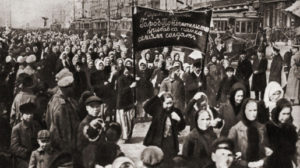Posts Tagged ‘International Women’s Day’
Women’s Voices Rising
One hundred and nine years ago on February 28, 1909 the first National Woman’s Day was observed in New York where women protested against working conditions in the garment industry. The following year a conference of women from 17 countries met in Copenhagen and established Women’s Day, called for March 8 to promote equal rights, including suffrage for women. The next year on March 8, 1911 International Women’s Day brought over a million people to the streets in Austria, Denmark, Germany, Switzerland, France and elsewhere to advocate for equal employment and wages and for the right to vote. In 1917 women in St Petersburg went on strike for “Bread and Peace,” demanding the end of World War I and the end to food shortages and the Czar. Four days later the Czar abdicated. Leon Trotsky wrote, “We did not imagine that this ‘Women’s Day’ would inaugurate the [Russian] revolution.” The gathering of women around the globe has continued over the last century with an abiding message that envisions each woman and girl being able to exercise her choices and participate without discrimination and fear in her society on an equal basis as men.

International Women’s Day demonstration in St. Petersburg, Russia in 1917. (Credit: Fototeca Gilardi/Getty Images)
In Lviv, Ukraine in mid-September, 2017, before #MeToo gained momentum in the U.S. and elsewhere, over 200 writers from 69 countries endorsed PEN International’s Women’s Manifesto (link and text below), a document that sets out principles, values and a vision for the times and for times ahead.
Delegates at PEN’s annual Congress, representing countries from every continent—men and women, Christian, Muslim, Jew, Buddhists, Hindi, atheist, multi-racial, multi lingual and politically diverse—voted for the document. PEN members do not always agree but are committed to freedom of expression and to the ideal of respect for human dignity and diversity. These are big words and big ideals and their interpretation is at times disputed among writers, who are often skeptical of words like “Manifesto.” But in the historic city of Lviv in the center of Europe’s own divide, they came together to affirm:
THE PEN INTERNATIONAL WOMEN’S MANIFESTO
The first and founding principle of the PEN Charter asserts that ‘literature knows no frontiers’. These frontiers were traditionally thought of as borders between countries and peoples. For many women in the world – and for almost all women until relatively recently – the first, and the last and perhaps the most powerful frontier was the door of the house she lived in: her parents’ or her husband’s home. For women to have free speech, the right to read, the right to write, they need to have the right to roam physically, socially and intellectually. There are few social systems that do not regard with hostility a woman who walks by herself.
PEN believes that violence against women, in all its many forms, both within the walls of a home or in the public sphere, creates dangerous forms of censorship. Across the globe, culture, religion and tradition are repeatedly valued above human rights and are used as arguments to encourage or defend harm against women and girls.
PEN believes that the act of silencing a person is to deny their existence. It is a kind of death. Humanity is both wanting and bereft without the full and free expression of women’s creativity and knowledge.
PEN ENDORSES THE FOLLOWING INTERNATIONALLY RECOGNISED PRINCIPLES:
- NON-VIOLENCE: End violence against women and girls in all of its forms, including legal, physical, sexual, psychological, verbal and digital; promote an environment in which women and girls can express themselves freely, and ensure that all gender-based violence is comprehensively investigated and punished, and compensation provided for victims.
- SAFETY: Protect women writers and journalists and combat impunity for violent acts and harassment committed against women writers and journalists in the world and online.
- EDUCATION: Eliminate gender disparity at all levels of education by promoting full access to quality education for all women and girls, and ensuring that women can fully exercise their education rights to read and write.
- EQUALITY: Ensure that women are accorded equality with men before the law; condemn discrimination against women in all its forms and take all necessary steps to eliminate discrimination and ensure the full equality of all people through the development and advancement of women writers.
- ACCESS: Ensure that women are given the same access to the full range of civil, political, economic, social and cultural rights to enable the full and free participation and public recognition of women in all media and across the spectrum of literary forms. Additionally, ensure equal access for women and girls to all forms of media as a means of freedom of expression.
- PARITY: Promote the equal economic participation of women writers, and ensure that women writers and journalists are employed and paid on equal terms to men without any discrimination.